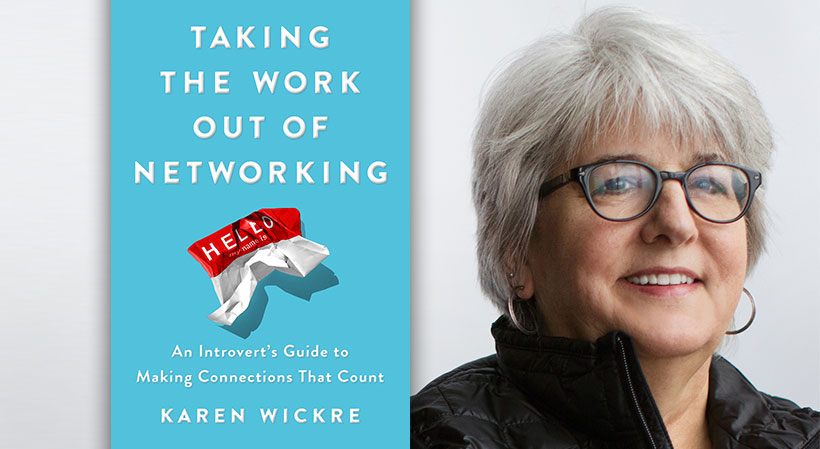The following is excerpted from “Taking the Work Out of Networking: An Introvert’s Guide to Making Connections That Count” by Karen Wickre. Copyright © 2018 by Karen Wickre. Reprinted by permission of Touchstone, an Imprint of Simon & Schuster, Inc.
Networking is more about farming than it is about hunting.
—Ivan Misner
The fact is that for many of us, making career and life moves is more a mix of fits and starts than it is a grand plan or a seamless upward trajectory. I offer myself as Exhibit #1, with as long and unplanned a career in Silicon Valley as one could have. By today’s standards, my career in tech began late: I was 35 in the mid-1980s when I got into the then-lively world of personal computer magazines. My longtime passion for writing and editing helped me to become a consumer tech journalist, a (reluctant) PR flack, and an editorial and project manager for startups and creative agencies. Not a straight path, in other words.
In 2000, Silicon Valley experienced a major economic downturn. I had joined an 18-person startup that year, an early e-commerce personal gift business called Violet.com. Four tumultuous months later, we turned off the lights for good; no second round of funding was forthcoming. I went on to an established creative agency that was opening a San Francisco office. That turned out to be bad timing (downturns don’t lead to clients), and before long the firm decamped to its LA office—without me. By the end of the year, there were very few jobs to pursue, and not much contract work. No one was hiring. Over the next 15 months or so, I struggled with not enough work or money. I started an informal support group for a few friends in the same boat. We met weekly to cheer each other on and share leads. I reached out to lots of contacts to see if they might need writing help. One of these calls was to a friend I’d worked with twice before, who had recently taken a job at a startup called Google. I asked if she needed any writing help; she told me they just hired a marketing writer but promised to keep me in mind.
Related: No Pressure Networking: A Q&A with Author Karen Wickre
A couple of months later, she called back. It seemed work was piling up. Would I come in and meet the team? She stressed that she couldn’t hire me directly; others would have to like my work (and me). I must have been a port in a storm, because at that very first meeting they asked me to jump in, which I did eagerly, working from home. Within a couple of weeks, it was clear that I should spend more time in the office to get face time with the team. I began the daily 70-mile-round-trip commute to Google HQ. Once I became a regular fixture, I raised my hand for every assignment. I wanted to be seen as indispensable as possible, because I could see Google was somewhere I’d like to be. Not a big partier by nature, I even hosted cocktail gatherings at my flat for the team—the team I wasn’t yet on. My goal was to become as familiar as the bean bag seating around the office so people would know they could rely on me, and that I was suitably Googley. It took 15 months for all the forces to converge for me to be hired into a full-time role as senior editor (a title I made up, by the way). I then remained at Google for eight more wonderful and life-changing years.
I recite this history for two reasons. One, I was able to call on someone in my network to make a meaningful connection when I really needed it. (It’s worth noting, too, that my friend was someone with whom I had stayed in loose touch, a habit I discuss in chapter 3.) Two, once I got a toehold inside Google, my work output was just the start: networking inside the organization was critical, especially as it grew very quickly from hundreds to thousands of employees. I had to rely on my soft skills—communication, empathy, curiosity—to maintain credibility with both men and women, technical and not, virtually all of whom were younger than me.
Sign Up: Receive the StartupNation newsletter!
Today I see both of these moves as hallmarks of my style of organic networking. I say “organic” because it’s instinctive: I do it when I don’t need anything. One result is that I have a casual and friendly acquaintance with lots of people, because I use these soft skills as a matter of course. Friends sometimes say that I “know everyone.” That’s not true, of course—but I do have a good sense of who everyone is. In other words, I remember names and connections; I keep up with people’s accomplishments and job changes. That turns out to matter for networking. It’s a mark of curiosity about who else is out in the world, who’s making news, who’s interesting, who’s connected to people I already know. To me, such knowledge is a key part of the introvert’s observational powers.
It surprises people when I tell them I think it’s precisely because of my introverted nature that I’ve cultivated a kind of personal strength that comes from access to wide-ranging connections.
“Taking the Work Out of Networking” is available now at fine booksellers and can be purchased via StartupNation.com.






